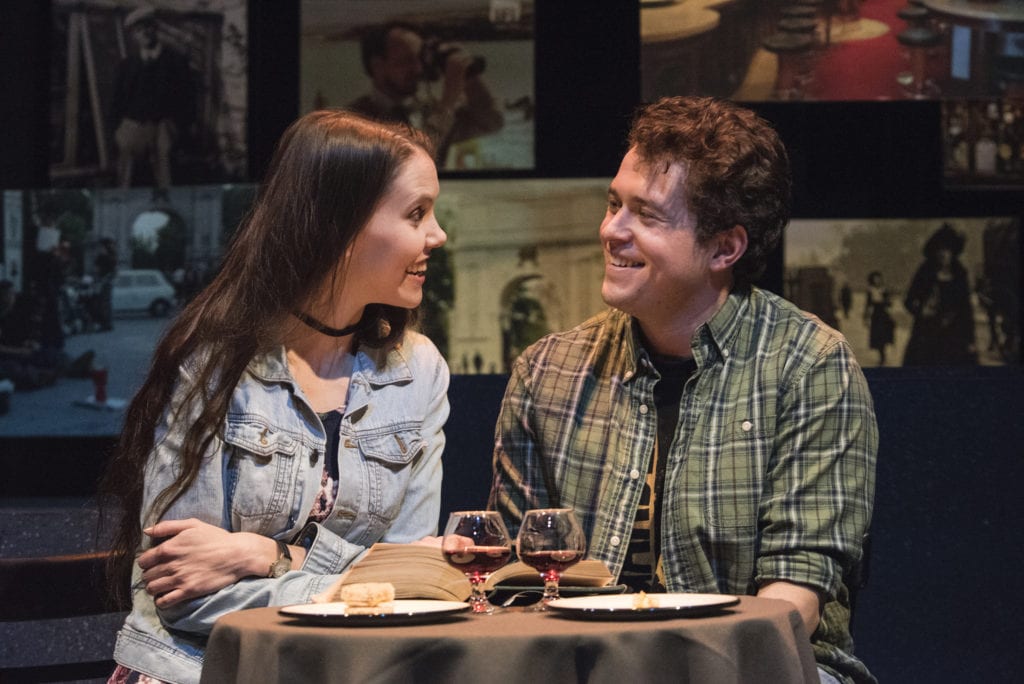
Bloomsday Makes for a Lovely Outing in Dublin…and Boulder
by Juliet Wittman, Westword Magazine (Read the original.)
Bloomsday is an annual celebration of James Joyce’s novel Ulysses, which takes place during a single day in the life of protagonist Leopold Bloom: June 16, 1904. On Bloomsday, celebrants — natives and tourists alike —retrace Bloom’s steps as he traversed the city of Dublin, stopping at various pubs along the way. In Steven Dietz’s play of the same name, Caithleen, a young tour guide, encounters an older man, Robert, who’s contemptuous of Ulysses, which he sees as “an under-read and over-praised piece of doggerel” (though, as a professor, he’s been teaching the book to students for years), and who seems to know a lot about her. He predicts the make-up of the group of tourists she will soon be escorting, and utters ambiguous comments about what has occurred in her life so far, and what’s yet to come.
Robert, we soon realize, is a visitor from another dimension of time. This is appropriate, since Ulysses in some ways folds a man’s lifetime into just a day. Not only that, this middle-aged, somewhat cynical professor is, in fact, the youngster Robbie, with whom Caithleen will fall in love when she meets him on her tour.
Or perhaps Robert isn’t a visitor from the future, but a hallucination, since Caithleen will confess she’s subject to slips of time. Though she could equally well be Robert’s hallucination.
I’ve been a fan of Steven Dietz’s ever since I saw his Inventing Van Gogh brilliantly brought to life by Curious Theatre Company many years ago. He’s a prolific and much-produced playwright who was born and raised in Denver, though he doesn’t live in the state now. After Van Gogh, I saw Dietz’s Fiction (Miners Alley Playhouse) and Yankee Tavern (Curious, again), so I had some strong expectations of the Boulder Ensemble Theatre Company’s staging of Bloomsday, a regional premiere. Those other plays all had certain features in common: They were intricately plotted, though never entirely logical or linear. They conveyed a sense of mystery, wonder, the general incomprehensibility of life. I don’t think I’m giving anything away in telling you that Robbie eventually appears to re-enact that single, never-to-be-forgotten day with Caithleen, and middle-aged Caithleen — Cait — also turns up to add a quota of wisdom, sadness, nostalgia and even faint hope. Perhaps now, after years of thought and increased understanding, Cait and Robert can finally unite.
Though the events in Bloomsday are fantastical, the play is a very different animal from the other examples of Dietz’s work that I’ve experienced. I kept waiting for the plot to start tangling like a cat’s cradle, to encounter an off-kilter or surprising development or be provided with some mystical revelation. But once you’ve accepted the basic premise, taken in the ambiguities of love seen from the perspective of the very young and balanced against that of the mature, once you’ve sensed that perhaps there’s a darker side to Caithleen’s imaginings, everything that follows is pretty straightforward.
Under Jada Suzanne Dixon’s direction, the production is clear and bright. Evocative images of the various places mentioned in Ulysses adorn the back wall of the set; furnishings are sparse because the script requires fluidity of movement, with benches, a table and chairs, plates and wineglasses deftly moved into place by the actors. Kate Parkin is a very appealing Caithleen, her vulnerability pierced by occasional sparks of fierce defiance, and Megan Van De Hey is expressive as wisely ironic Cait. Dietz has written some of the most Joycean lines for this character, and Van De Hey does full justice to their music. Robbie isn’t well-defined as a character; we don’t see in him the intellectual curiosity that will cause him to devote his life to teaching literature. Perhaps Dietz intended this to prefigure the adult Robert’s contempt for Ulysses, though that seems based more on fascinated obsession than ultimate judgment. Hasn’t almost everyone who’s ever attempted that thick tome found him or herself swinging from intimidation to irritation to — with luck — eventual pleasure? Still, Peter Bussian does well in communicating the youngster’s energy and the humorous cunning with which he dispatches Caithleen’s other group members so that he can get her to himself. There’s also a very strong and interesting performance from Justin Walvoord as Robert.
Though I wouldn’t say it goes deep, Bloomsday does make for a charming and often touching evening of theater.
